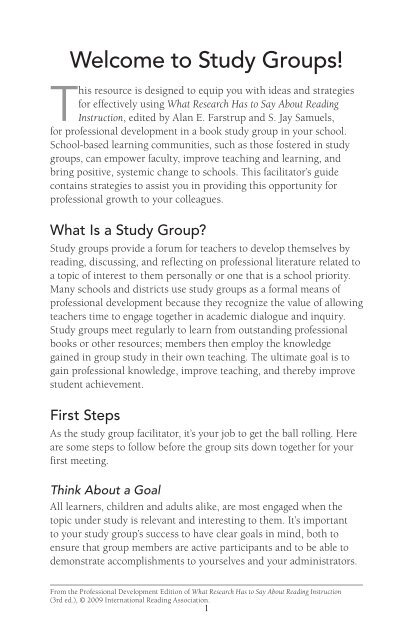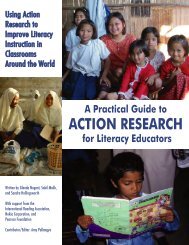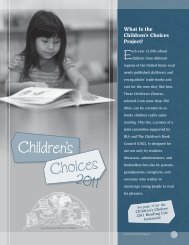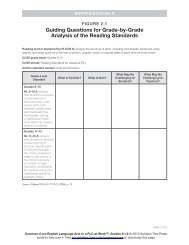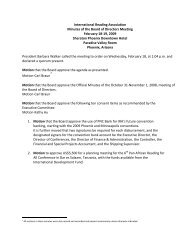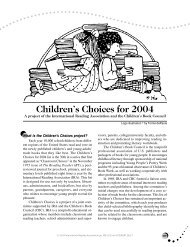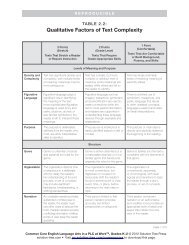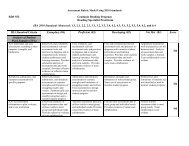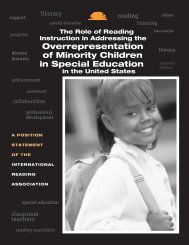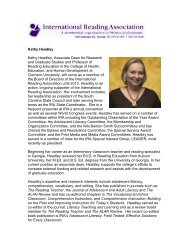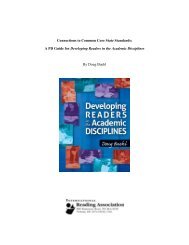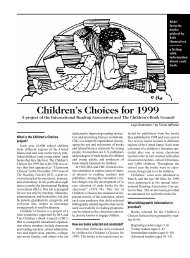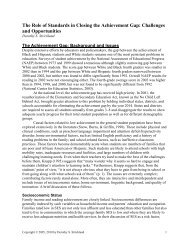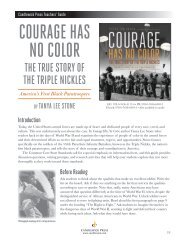What Research Has to Say About Reading Instruction - International ...
What Research Has to Say About Reading Instruction - International ...
What Research Has to Say About Reading Instruction - International ...
You also want an ePaper? Increase the reach of your titles
YUMPU automatically turns print PDFs into web optimized ePapers that Google loves.
Welcome <strong>to</strong> Study Groups!<br />
This resource is designed <strong>to</strong> equip you with ideas and strategies<br />
for effectively using <strong>What</strong> <strong>Research</strong> <strong>Has</strong> <strong>to</strong> <strong>Say</strong> <strong>About</strong> <strong>Reading</strong><br />
<strong>Instruction</strong>, edited by Alan E. Farstrup and S. Jay Samuels,<br />
for professional development in a book study group in your school.<br />
School-based learning communities, such as those fostered in study<br />
groups, can empower faculty, improve teaching and learning, and<br />
bring positive, systemic change <strong>to</strong> schools. This facilita<strong>to</strong>r’s guide<br />
contains strategies <strong>to</strong> assist you in providing this opportunity for<br />
professional growth <strong>to</strong> your colleagues.<br />
<strong>What</strong> Is a Study Group?<br />
Study groups provide a forum for teachers <strong>to</strong> develop themselves by<br />
reading, discussing, and reflecting on professional literature related <strong>to</strong><br />
a <strong>to</strong>pic of interest <strong>to</strong> them personally or one that is a school priority.<br />
Many schools and districts use study groups as a formal means of<br />
professional development because they recognize the value of allowing<br />
teachers time <strong>to</strong> engage <strong>to</strong>gether in academic dialogue and inquiry.<br />
Study groups meet regularly <strong>to</strong> learn from outstanding professional<br />
books or other resources; members then employ the knowledge<br />
gained in group study in their own teaching. The ultimate goal is <strong>to</strong><br />
gain professional knowledge, improve teaching, and thereby improve<br />
student achievement.<br />
First Steps<br />
As the study group facilita<strong>to</strong>r, it’s your job <strong>to</strong> get the ball rolling. Here<br />
are some steps <strong>to</strong> follow before the group sits down <strong>to</strong>gether for your<br />
first meeting.<br />
Think <strong>About</strong> a Goal<br />
All learners, children and adults alike, are most engaged when the<br />
<strong>to</strong>pic under study is relevant and interesting <strong>to</strong> them. It’s important<br />
<strong>to</strong> your study group’s success <strong>to</strong> have clear goals in mind, both <strong>to</strong><br />
ensure that group members are active participants and <strong>to</strong> be able <strong>to</strong><br />
demonstrate accomplishments <strong>to</strong> yourselves and your administra<strong>to</strong>rs.<br />
From the Professional Development Edition of <strong>What</strong> <strong>Research</strong> <strong>Has</strong> <strong>to</strong> <strong>Say</strong> <strong>About</strong> <strong>Reading</strong> <strong>Instruction</strong><br />
(3rd ed.), © 2009 <strong>International</strong> <strong>Reading</strong> Association.<br />
1


